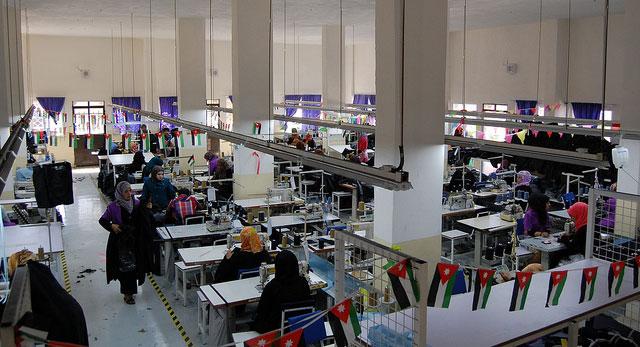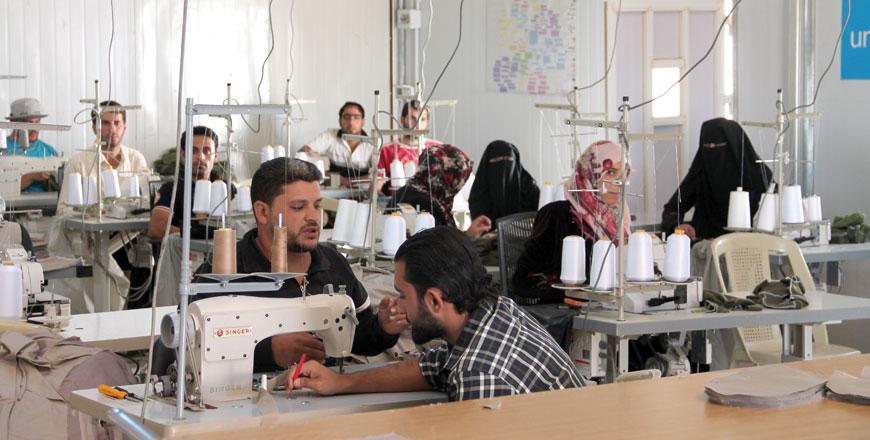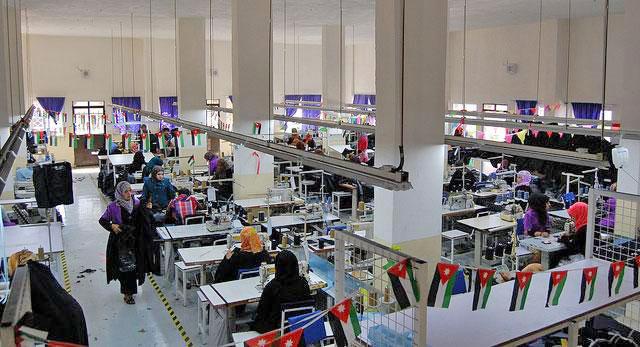You are here
Industrial sector leaders say integrating Syrians in workforce no threat to Jordanians
By Omar Obeidat - Feb 22,2016 - Last updated at Feb 22,2016

The garment industry is not attractive to Jordanians, although thousands of jobs are available there for citizens (File photo)
AMMAN — As the government vowed to allow Syrian refugees to join the Kingdom's labour market if the world helps with encouraging sufficient foreign investments, private sector figures and experts believe Syrians would not crowd out Jordanians for jobs but would only compete with hundreds of thousands of other guest workers.
They told The Jordan Times in phone interviews recently that the majority of Jordanian jobseekers still steer away from certain sectors, such as agriculture, textiles and construction.
Commenting on fears by some Jordanians that integrating Syrians into the labour market may affect opportunities offered to local workers, the sector leaders said the plan is to direct Syrians only to jobs shunned by Jordanians.
On February 4 –– during London's Supporting Syria and the Region Conference –– donor countries pledged hundreds of millions of dollars to help Jordan cope with the Syrian refugee crisis in the form of grants and cheap loans, while the Kingdom pledged to integrate Syrians in the labour market, suggesting an approach that would not affect job opportunities for Jordanians.
The proposed government measures could provide 200,000 job opportunities for Syrians in the coming years through new investments in five designated development zones: Irbid, Karak, Muwaqqar, Maan and Mafraq.
At a meeting with representatives and key figures from Mafraq Governorate earlier this month, His Majesty King Abdullah said that for each job opportunity created for a Syrian worker, five job opportunities will be created for Jordanians, describing the outcome of the London conference as a beginning to be built on.
During the London conference, the EU pledged to ease the rules of origin requirements on Jordanian products bound for the EU and the government expects such a measure would generate investments and increase the Kingdom’s exports to the markets of the 28 member states of the union.
Maher Mahrouq, director of the Jordan Chamber of Industry, agreed that the potential investments in the development zones would stimulate the Kingdom’s economy and create jobs for Jordanians and Syrians.
He said that most investment opportunities could be in the industrial sector, where, he said, Jordanians represent around 85 per cent of its workforce.
However, Mahrouq said that there are certain industries such as textiles and building materials that still struggle to lure Jordanian labour, adding that Syrians could replace foreign workers in these fields.
“Jordan should work seriously on cashing the gains made at the London conference because it is an important opportunity for our economy,” he said, calling on decision makers to offer an attractive business environment and incentives for potential investors.
Fathallah Emrani, president of the General Trade Union of Workers in Textile, Garment and Clothing Industries, said that garment factories still strive to meet the quota imposed by Labour Ministry, namely, that at least 25 per cent of the workforce should be Jordanians.
The ratio was raised to 30 per cent as of the beginning of this year, but “unfortunately” people still seek government jobs, he said, indicating that the sector employs 44,000 guest workers from 10 different nationalities and only 16,000 Jordanians.
There are 73 garment factories in industrial estates across the Kingdom, Emrani said, noting that only dozens of Syrians work in the sector.
“There are plans to replace 2,000 foreign workers with Syrians,” he said, adding that integrating Syrians in the textile industry entails no risks to the chances of Jordanian jobseekers.
“There are thousands of jobs available now for Jordanians in garment factories; they just need to apply,” Emrani said.
Labour market expert Ahmad Awad, director of the Phenix Centre for Economic and Informatics Studies, said that Syrian refugees work mainly in the services sector, construction and restaurants, where they compete for jobs already dominated by Egyptians.
He said that there are already around 100,000 Syrians in the labour market without work permits, adding that Jordan’s pledge to allow Syrians work would help authorities regulate the market and generate more revenues for the Treasury.
“They will only replace guest workers, particularly those whose work permits have expired,” Awad said.
Jordan can take advantage of this deal by attracting more investments but there is an “urgent” need to review business-related legislation, he added.
Related Articles
AMMAN — The Textile, Garment and Clothes Union and the International Labour Organisation (ILO) alongside the Better Work Project-Jordan on S
AMMAN — President of the Textile, Garment and Clothes Union Fathalla Emrani on Thursday called on key stakeholders in the industry to “formu
AMMAN — Garment exports are increasing, and will continue to grow, a study published on Sunday by the European Bank for Reconstruction and D













